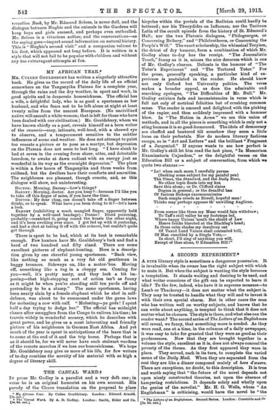MY AFRICAN YEAR*
Mn. CULLEN GOVLDSBURY has written a singularly attractive book. He gives us the record of the daily life of an official somewhere on the Tanganyika Plateau for a complete year, through the rains and the dry weather, in sport and work, in good spirits and in desperate homesickness. The official has a wife, a delightful lady, who is as good a sportsman as her husband, and who fears not to be left alone at night at least twenty miles from the nearest European. (No uncivilized native will assault a white woman; that is left for those who have been daubed with our civilization.) Mr. Gouldsbury, whom we have known chiefly as a poet, reveals himself as a born writer of the causerie—easy, intimate, well-bred, with a shrewd eye to observe, and a temperament sensitive to the subtler influences of scene and weather. He does not attempt to paint
too roseate a picture or to pose as a martyr, but depression on the Plateau does not seem to last long. "I have slunk to
bed at seven in the evening from sheer, utter, and detestable boredom, to awake at dawn radiant with an energy just as wonderful in its way as the overnight depression." The place is within a few hours of Tanganyika and three weeks from railhead, but the dwellers have their comforts and amenities. The neighbours are pleasant, though remote, and, as this dialogue will show, not uninteresting.
Docron: Morning, Barney—how's things ?
BARNEY: Morning, doctor. Are you busy ?—because I'd like you to take off this finger of mine, if you have the time. DOCTOR: My dear chap, one doesn't take off a finger between drinks, so to speak. What have you been doing to it ?—let's have a look.
BARNEY (exhibiting a much mangled finger, apparently held together by a well-used bandage) : Dunno ! Blood poisoning, probably—scratched it, going round the kraals the other night, and it's been swelling ever since. I got fed up with it yesterday, and had a shot at taking it off with the scissors, but couldn't quite get through
There is sport to be bad, which at its best is remarkable enough. Few hunters have Mr. Gouldsbury's luck and find a herd of two hundred and fifty eland. There are some excellent pictures of elephant-hunting. Here is a descrip-
tion given by one cheerful young sportsman. "Back view, like nothing so much as a very fat old gentleman in baggy trousers. Sideways on, like a motor-'bus. Moving off, something like a tug in a choppy sea. Coming for you—well, it's pretty nasty, and they look a bit im- posing—that high-stepping sort of action isn't as funny as it might be when you're standing still ten yards off and pretending to be a stump." The same sportsman, having been nearly slain by a female elephant which he shot in self- defence, was about to be summoned under the game laws for molesting a cow with calf. "Molesting—ye gods ! I spent half a day trying to dodge her." The official has midnight chases after smugglers from the Congo to enliven his time; he travels widely in wonderful scenery, which he describes with great power, and he gives us a most interesting and friendly picture of his neighbours in German East Africa. And yet much of the year is spent in anticipations of the leave that is to come at the end of it and the trip home. Perhaps that is as it should be, for we will never have such stalwart wardens of the remote marches if we lose our homesickness. We hope Mr. Gouldsbury may give us more of his life, for few writers of to-day combine the novelty of his material with so high a degree of literary skill.










































 Previous page
Previous page